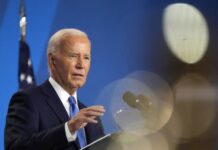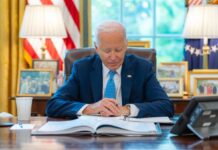By Francis Ogwo
China has opposed the ban on the country’s telecoms giant Huawei on its 5G network project describing it “groundless”.
According to Foreign Ministry spokeswoman, Hua Chunying, Beijing would “take measures to safeguard” the “legitimate interests” of Chinese companies.
US President Donald Trump had applauded the decision by the UK saying it was a security risk
“We convinced many countries, many countries – and I did this myself for the most part – not to use Huawei because we think it’s an unsafe security risk,” Trump stated.
According to reports, Trump’s comments were premised on his attempt to increase pressure on Beijing by announcing an executive order ending preferential treatment for Hong Kong in response to a new security law brought in by China.
Recall that the Chinese telecoms giant, Huawei, was banned by the United Kingdom on its 5G telecom network, which reverses an earlier decision in January decision approving the brands stake in the super fast wireless project.This is according to a release by UK government on Tuesday.
From the directive, operators such as BT (BTGOF) and Vodafone (VOD) were given until 2027 to remove existing Huawei equipment from their 5G networks.
According to the Digital and Culture Minister, Oliver Dowden, there is an overhaul of the plans stemming from new US sanctions imposed on the company in May.
In his words, “Given the uncertainty this creates around Huawei’s supply chain, the UK can no longer be confident it will be able to guarantee the security of future Huawei 5G equipment,” Dowden noted.
In a speech by US Secretary of State, Mike Pompeo, last month, he has said that “the tide is turning against Huawei as citizens around the world are waking up to the danger of the Chinese Communist Party’s surveillance state.”
This development however, according to Dowden, may risk an earlier plan by China and Britain in building bilateral trading opportunities post-Brexit, and will delay the rollout of 5G across the country by at least a year.
There was an impediment on the US campaign against Huawei until the new sanctions in May further limited the company’s ability to manufacture and obtain semiconductor chips using American-made technology.
The fallout was another UK security review of the company’s involvement in the British network, which led to the decision by the National Security Council on Tuesday to order the phased removal of its technology.
Observers say the decision is a huge blow for Huawei, which has operated in Britain for 20 years with Europe serving as a key market for the company, accounting for 24% of sales last year.
Huawei had on Monday announced half year results earlier than the normal with reports of slower revenue growth.
This revealed that the company is already experiencing a decline in smartphone sales, after Washington blocked it from accessing popular Google apps. The phones became a lot less attractive in markets outside of China as a result.
Huawei also said it was confident that the recent US sanctions would not have affected “the resilience or security” of its products and described the UK’s announcement as disappointing.
“It threatens to move Britain into the digital slow lane, push up bills and deepen the digital divide,” said Ed Brewster, a spokesperson for Huawei UK. “Regrettably our future in the UK has become politicized, this is about US trade policy and not security.”
The US sanctions restrict companies like TSMC (TSM), a Taiwan-based firm, from exporting computer chipsets and other key components to Huawei. Without them, Huawei can’t build 5G base stations and other equipment.
An analyst for Jefferies, Edison Lee, has last month said, “Based on the current direct export rule that the US put on, I really think that Huawei’s 5G equipment business is in grave danger,”
There has been a mounting pressure on UK Prime Minister, Boris Johnson, from lawmakers within his own party, along with the Trump administration, which argues that the Chinese government could use Huawei for spying and even sabotage.
Washington had warned that US-UK intelligence sharing and military collaboration could be put at risk if Britain went ahead with its plan.
Under Chinese law, Chinese companies can be ordered to act under the direction of Beijing. Huawei has consistently denied that it would help the Chinese government to spy, and says it is “100% owned by employees.”
On Tuesday, before the UK announcement, China’s Foreign Ministry repeated a previous warning by its ambassador that the decision would have consequences for the wider relationship between the two countries.
“Whether the UK can provide an open, fair and non-discriminatory business environment for Chinese companies … is a litmus test for British markets after Brexit, and it is also an indicator for China’s investment in the UK,” foreign ministry spokesperson, Zhao Lijian, said.
Analysts say Huawei had lobbied hard to influence the UK government towards launching an advertising campaign last month emphasizing its history of investment and job creation in the country. This month, it announced that it had received approval to build a sprawling $1.25 billion research facility in Cambridge.
Huawei is already an integral part of Britain’s existing 4G infrastructure, and telecom operators will not be required to swap out the company’s equipment in those networks.
The Chinese company’s European rivals said they were ready to fill the 5G void left by Huawei.
Nokia (NOK) said in a statement that it has the “capacity and expertise to replace all of the Huawei equipment in the UK’s networks at scale and speed.”
Europe and Latin America president for Ericsson (ERIC), Arun Bansal, said in a statement that the Swedish company “has the technology, experience and supply chain capacity,” to help the United Kingdom reach its 5G goals.
Nonetheless, the UK will pay a hefty price for kicking out Huawei. The government said on Tuesday that the cumulative delay to 5G networks from the ban on new Huawei equipment and replacing its existing technology would be two or three years, at a total cost of as much as £2.5 billion ($3.1 billion).
That means British consumers and businesses will have to wait longer, and possibly pay more, for the services that the extra bandwidth can support, such as self-driving cars and advanced manufacturing and healthcare applications.
“Obviously we are disappointed because this decision — as the government has highlighted today — will add delay to the roll-out of 5G in the UK and will result in additional costs for the industry,” a Vodafone spokesperson said.
Huawei Technologies Co., Ltd is a Chinese multinational technology company with its headquarters in Shenzhen, Guangdong. It provides telecommunications equipment and sells consumer electronics like smartphones.











